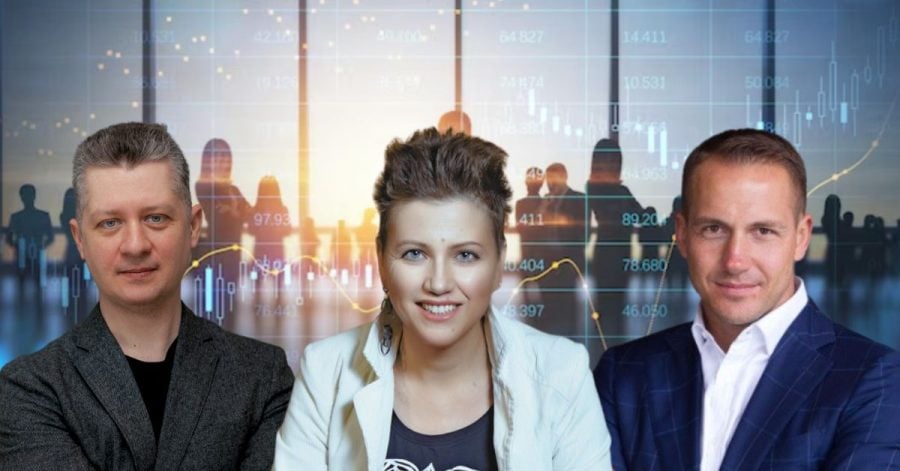In the fast-paced world of venture capitalism, where million-dollar deals are made with a flick of a pen or a swipe at the touchscreen, the path to starting a successful VC fund can seem like a herculean task. However, for those with an entrepreneurial spirit and a keen eye for promising startups, the potential rewards are tantalizing.
Getting those rewards is the hard part though. According to investors themselves, launching a VC fund requires a combination of financial acumen, industry expertise, deep understanding of the startup ecosystem, choosing the right team, and a lot more.
And it’s not just about having deep pockets – there are the difficult tasks about identifying unique investment opportunities, nurturing entrepreneurial talent, and providing strategic guidance to early-stage companies. How does one start a VC fund from scratch and what does it take to make a winning team, read our analysis piece to find out.
One step at a time
For Romanian entrepreneur Bogdan Iordache the experience of launching a VC fund is still fresh – having launched seed-stage fund Underline Ventures a year ago. First, Iordache started identifying the value the fund could bring to the market and assessed the interest that potential investors would have for a new venture fund.
“My conclusion was that Eastern European startups started by more experienced teams, with founders that have already worked in successful tech companies or have previously started other startups, are heavily underserved. This was, thankfully, well aligned with my professional background – I’ve been part of the tech scene for almost 20 years, and I know many of these founders, and I also know their needs and selection process. Or maybe this was a biased conclusion, due to my personal experience – but nevertheless, this was an area where I thought I could bring value and have a competitive advantage,” Iordache tells The Recursive.
Regarding the fundraising side, what worked for Iordache is that in 2021 many tech founders and operators had significant liquidity, and this helped him raise the first half of the fund, start doing investments, and attract capital from new LPs in subsequent closings.
For Sandra Golbreich, general partner of Baltic Sandbox Ventures, an early-stage VC focused on Baltic-based founders building deep tech and life science solutions, the experience was a bit different.
Founded in 2018, Baltic Sandbox Ventures wasn’t started from scratch, as it had the support of a startup accelerator. However, as Golbreich explains, the VC establishment process is still significantly different and more complex.
“We have institutional limited partners (LPs) and some private LPs. The paperwork consumed a significant amount of time, spanning 19 months from inception to becoming operational. Another time-consuming aspect is fundraising with private LPs. Fortunately, we had established good relationships in our local ecosystem, which enabled us to secure initial funding within a few months. However, we’ve observed that in many other cases, it takes up to a year for other VCs due to the current market situation,” she explains.
Lithuanian VC investor Audrius Milukas is the CEO of Open Circle Capital, a fund investing in companies in the fields of ICT, robotics and high-tech since 2017. At the time he and his partners saw an opportunity when there weren’t too many other VC funds on the radar.
“Open Circle Capital (OCC) started its first early-stage fund back in 2017. Together with other fund partners Rokas Tamosiunas (LT), Jens Damsgaard (DK) and Will Cardwell (FI/US), we saw a window of opportunity to invest in local startups as there was only one active VC fund which basically had no competition. As a result, we joined forces, applied our international experience and managed to win backing from INVEGA, a state-established financial institution. We also closed a number of corporate LPs to start activities in our €20 million fund,” Milukas shares with The Recursive.
However, as he points out, successful fundraising didn’t happen overnight. “It took us more than one year of building fund strategy, applying for public tenders, negotiating LPA and meeting private LPs,” he explains.
Selecting the right team
Choosing the right team is the next step for making a successful VC fund. In the case of OCC, both Milukas and his fund partners had extensive experience in the field.
“Both Will and Jens have been running VC funds, making angel investments and managing tech-transfer activities in the Nordics since the 2000s. Rokas is known for being among people who kickstarted the startup ecosystem in Lithuania 15 years ago by being a mentor and starting the first local accelerator – Startup Highway. Lastly, my personal journey in the startup world started as a founder in 2016 when I co-founded fintech company SME Finance which right now is among the most well-known fintechs in the region,” he reflects on their journey.
However, it is not enough just to have the experience – sometimes the chemistry among the partners can prove to be much more important, Milukas notes.
“First of all you need to have a great chemistry among partners since you are committing to do business together for a long term (usual term of the fund – 10 years). Also you want to have a diverse team. You need to work among people with different backgrounds such as investment management, technology building, entrepreneurship in order to make the best investment and fund management decisions,” he adds.
For Iordache, if one chooses to work with less experienced founders then he might want to have a bigger partner team that has operational experience in the same markets/business models as the portfolio companies.
“This is done so you can work more closely with them, and guide them in their decision process. If you work with more experienced founders, there’s less need for this, and providing operational support (hiring, comms, financials etc.) is more important, and we focused our efforts on building our team in that direction. And, even if we work with less experienced founders, operational support can still be useful and a strong differentiator when joining a round with multiple investors,” Iordache tells The Recursive.
In order to have a team that will remain for years, one has to think of aspects such as strategic vision and adaptability among others, Baltic Sandbox’ Golbreich explains.
“If I were to establish a VC team from scratch, I would prioritize individuals with a deep understanding of investment areas and a passion for working with startups. Strategic vision, adaptability, and long-term commitment are crucial since VC is a long-term endeavor, and the team will remain together for years. In general, the role of a GP/Venture Partner closely resembles that of a startup founder, and prior experience in startup funding is genuinely valuable,” she adds.
Long-term commitment and responsibility
While VC life may appear glamorous at conferences, it’s a demanding job that requires considerable time and effort, Golbreich notes. Therefore, if one is looking to get onto such a path, they need to prepare for a long-term commitment and significant responsibility.
“It entails long-term commitment, significant responsibility, and financial returns that come at the end of the game if you excel. In our case, establishing a VC was the logical next step after the accelerator. Therefore, I advise investing in startups as an angel or participating in private accelerators before embarking on the fundraising process for a VC. This ensures that you genuinely have the dedication to pursue it for the next decade,” Golbreich tells The Recursive.
As with any endeavor, bringing a differentiated value to both your founders and investors can make all the difference, Underline Ventures’ Iordache emphasizes.
“This can only be connected to your previous experience – it’s hard to credibly pitch a value proposition that is not connected to your previous track record. Timing also matters, and being able to explain how this connects to an immediate opportunity makes a significant difference,” he tells The Recursive.
Aside from being different, a newly established VC also needs to be superior to the competition in order to be successful, Milukas adds.
“Starting a VC is a similar experience as building a startup – you need to have a great story to win trust from initial investors and then you need to demonstrate the results in order to keep growing and building your brand,” he tells The Recursive.
Additionally, it is very important to build an extensive and professional network in the target geography and strategic areas. “Despite the current movement of data-driven funds, VC remains to be an asset class which heavily relies on personal relationship building in almost all the steps starting from screening and ending with making investments and managing them,” the Lithuanian investor points out.
And last but not least, one also needs to be very patient and ready for many failures.
“You will need a lot of patience and ability to overcome failures in order to survive a fundraising process. It is a long-term game and could take up to two years of constant NOs from potential investors, pivoting and managing other obstacles on the way to success.” Milukas concludes.








